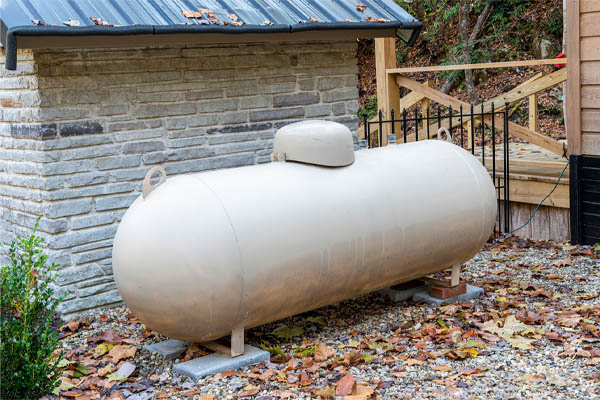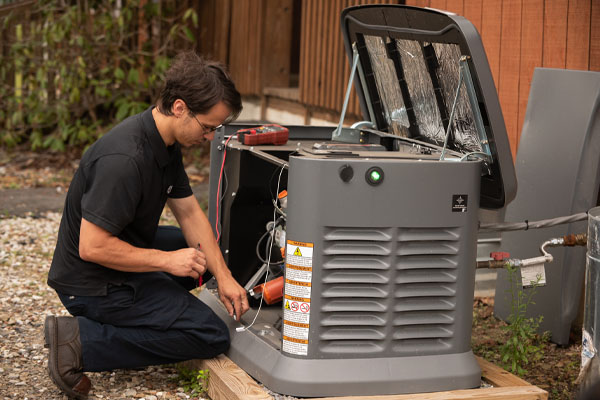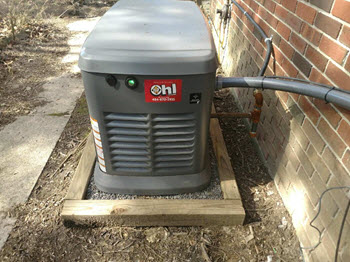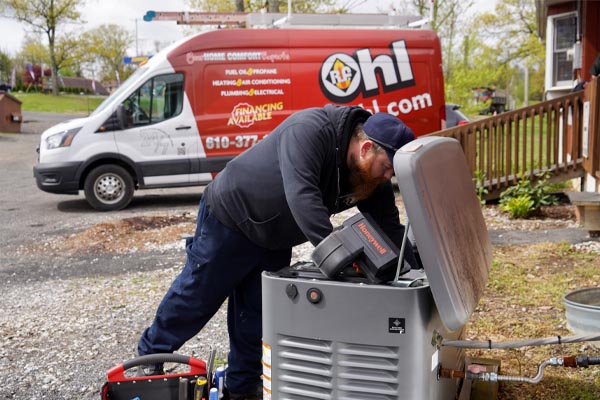10 Reasons Why Your Standby Generator Won’t Start

Standby generators are dependable backup power sources during outages. However, they will encounter problems at some point, like all machineries do. One of the top issues is a standby generator that won’t turn on when it’s supposed to. Keep reading to learn the ten most likely causes your standby generator won’t start. These reasons include fuel-linked problems, malfunctioning components, neglecting maintenance, and battery issues.
Top 10 Causes A Standby Generator Won’t Start
Contents
This article lists the top ten reasons your standby generator fails to start.
Related Article: Signs it’s Time to Replace Your Standby Generator
1. Fuel Problems

Fuel is vital for generators to work because it powers the generator engine. It is an energy source that allows electricity production. Here are several fuel-related problems and effects on the operation of your standby generator:
- Low Fuel: If there isn’t enough fuel, the generator won’t start or it will shut down in the middle of operation. Ensure the generator tank has sufficient fuel to enjoy an uninterrupted power supply. Track your fuel usage and refuel as needed. These are vital steps, especially during prolonged power outages.
- Poor Fuel Quality: The fuel quality affects the generator’s performance. Low-quality or contaminated fuel can cause problems in the generator’s engine. It may cause carburetor problems, blocked fuel filters, and engine damage. Therefore, you must always use high-quality, clean fuel compatible with your specific generator model. You should also adhere to the manufacturer’s fuel type and additives recommendations.
- Fuel System Leaks: Fuel system leaks may be caused by faulty connections, degraded seals, or damaged fuel lines. This problem wastes fuel and causes safety risks. If exposed to an ignition source, fuel can cause fires or explosions. Ensure your fuel system receives regular checkups to find and resolve leaks immediately. Tighten connections, change faulty seals, and replace damaged fuel lines to prevent leaks and maintain safe generator operation.
2. Battery Failure
A generator battery is responsible for converting chemical energy into electrical energy. This is done using the electrochemical process. The battery acts as a standalone power source, providing the startup energy the generator needs to run.
Unfortunately, battery failure can still occur. Three of the common causes of this problem are old age, extreme temperatures, and poor maintenance.
Related Article: What Is A Standby Generator?
3. Control Panel Issues

The control panel is the central interface to monitor and control the generator’s multiple functions. It is where you start and stop the generator, track electrical parameters like frequency and voltage, and manage system settings. The control panel also has vital safety features, including warning indicators and circuit breakers. It is the control hub where you can effectively control and operate your generator according to your power needs.
Likely problems with control panel settings and operation are misinterpreting readings, incorrect control adjustments, and wrong configuration.
4. Blocked Fuel Lines
Fuel lines are where fuel passes through to get from the tank to the engine. They ensure the fuel flow is steady and consistent so the engine receives the necessary energy for combustion. Fuel lines that work as they should help maintain the generator’s performance. It also ensures you get an uninterrupted power supply.
Fuel line blockages can happen because of several factors, such as the accumulation of debris, sediment, and contaminants over time. These clog the line and prevent the fuel from flowing freely, causing insufficient fuel supply to the engine. This may result in power fluctuations, engine misfires, reduced generator performance, and total engine failure.
Related Article: How Does A Generator Work?
5. Faulty Spark Plugs
Spark plugs ignite the blend of fuel and air inside the engine cylinders. They produce an electric spark that starts the combustion process. This then pushes the engine to generate mechanical power and produce electricity.
Spark plugs can also experience issues, such as:
- Fouling: This happens when deposit buildup on the spark plug keeps it from generating a strong spark.
- Wear and corrosion: This issue can weaken spark production.
- Improper gap: An incorrect gap between the spark plug electrodes can result in misfires or ignition failure.
6. Air Filter Issues
Air filters stop pollutants, dirt, and debris from entering the combustion chamber. These components ensure that the air intake is clean, the engine is protected from damage, and its efficiency is maintained.
Common air filter problems that can keep the generator from starting include clogging, dirt buildup, and damage. Clogging happens when the surface of the filter has a thick layer of dirt and debris, blocking the airflow to the engine. Dirt buildup is when excessive dirt accumulation lowers the filter’s effectiveness in catching the contaminants from the air. Damaged filters mean it has tears and holes that let unfiltered air inside the engine.
These issues cause inadequate air supply that impacts the combustion process, making generator startup challenging.
Related Article: How To Size A Standby Generator?
7. Coolant Levels

The coolant is responsible for regulating the engine’s temperature. It absorbs the combustion-generated heat, so the engine doesn’t overheat. Proper coolant circulation ensures the engine works optimally and its components are protected from damage. It also helps extend the service life of your whole-house generator.
High or low coolant levels can cause problems in the generator’s functionality. Insufficient coolant can cause engine overheating, which can damage the components. It can also result in engine failure, reduced performance, and increased wear and tear. On the other hand, excessive coolant levels can cause coolant leaks and pressure buildup.
Related Article: Things To Look For On A Generator To Make Sure It’ll Start Up Correctly When You Need It The Most
8. Outdated Software
The software is a crucial part of modern generators as it controls and manages several aspects of their operation. It helps you regulate power output, monitor system parameters, manage load distribution, and implement safety protocols. The software also allows you to remote monitoring, data analysis, data analysis, and diagnostics. It also improves reliability, efficiency, and ease of operation.
Outdated software can result in the generator failing to start because of glitches, inadequate functionality, or compatibility issues. It may not be able to communicate with engine parts properly. The lack of the required updates may also keep it from running optimally.
9. Starter Motor Failure
The starter motor starts the engine’s combustion process. It utilizes the battery’s electric power to engage the flywheel and spin it at high speeds. This rotation generates the needed momentum to start the engine so the generator can produce electrical power.
Several signs of motor failure include grinding sounds, clicking noises upon startup, and no response when the ignition is turned.
Starter motor failure can be due to solenoid issues, mechanical failures, electrical problems, and worn brushes. Other problems that can also contribute to the issue include electrical system problems, wear and tear, and improper upkeep.
Related Article: Backup Generators & Your Health
10. Poor Maintenance

Regular tune-ups are vital to ensure that the generator operates reliably and efficiently. It helps find and address potential problems before they worsen, extends your generator’s lifespan, lowers the risk of breakdowns during critical situations, enhances fuel efficiency, and ensures that the generator and its users are safe.
Neglecting maintenance can cause the generator to fail to start, as it means the potential issues build up and worsen as time passes. Neglected fuel filters, spark plugs, batteries, or other components can deteriorate. This can result in inefficient combustion or inadequate power supply.
Related Article: Tips For Standby Generator Maintenance
Tips for Troubleshooting & Preventing Generator Failures

Identifying problems early can keep potential failures. Follow these simple troubleshooting tips and prevent generator failures:
- Perform regular maintenance like checking fluid levels, examining fuel and air filters, and testing the battery. Clean or change the parts as needed.
- Maintain correct ventilation and ensure the generator is in a dry location.
- Prevent overloading the generator and practice balanced load distribution.
- Book professional servicing and follow the manufacturer guidelines about maintenance intervals and processes.
Conclusion
This article listed some reasons behind a generator failing to start. Regular maintenance and proper operation are important to ensure reliable generator operations. Many of these issues are preventable when you follow a maintenance schedule, perform routine maintenance, and resolve problems promptly. This ensures that your generator is ready to supply power when needed. Keep in mind that a well-maintained generator is a dependable backup power source, so you have peace of mind during outages or emergencies.
Related Article: Backup Generators & Your Health
Call R.F. Ohl For Your Standby Generator Needs

R.F. Ohl provides excellent whole-house generator services throughout the Poconos and the Lehigh Valley, Pennsylvania. We have a team composed of professionally certified and highly skilled technicians for all your high-quality standby generator service needs, such as backup generator maintenance, repairs, and installations. Each of our trained techs conducts prompt and accurate whole-house generator services at all times.
Rest assured, our company offers highly competitive on-demand generator service rates. Working with us means you can expect a friendly crew, reliable services, and transparent prices. All our work comes with a guarantee. To schedule a service appointment, call R.F. Ohl today. We offer free, in-home estimates.
Click here to contact us today or give us a call at (610) 377-1098 if you have any questions. Click the link to view our service area.